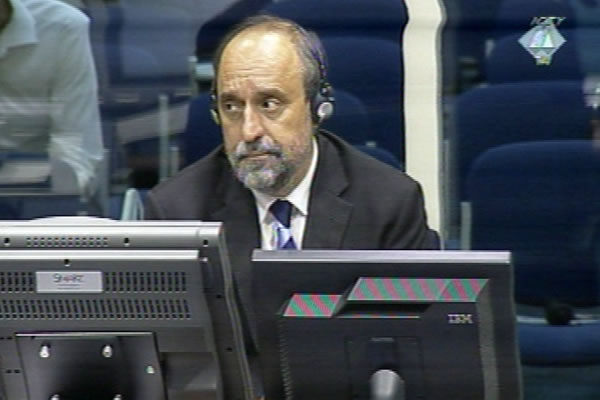Home
WHAT HADZIC ACTUALLY MEANT TO SAY
In the re-examination, Goran Hadzic tried to explain what he had meant with the statements he had made during the war. The prosecution alleges that in his statements Hadzic called for the expulsion of Croats and reprisals. Today Hadzic noted that his intention was to remind the public of the crimes perpetrated against Serbs. When he talked about ‘dealing with Croats who have blood on their hands’, Hadzic in fact meant Serbs too
 Goran Hadzic testify in his own defence
Goran Hadzic testify in his own defence Prosecutor Douglas Stringer noted in Goran Hadzic’s cross-examination that the Eastern Slavonia government implemented a policy whose goal was to make the Croats move out of the area. Hadzic, who was the prime minister at the time, threatened Croats and called for their expulsion and reprisals against them, prosecutor Stringer alleged.
In a bid to contest the claim in the re-examination, the defense counsel showed Hadzic’s interview to the newspaper Politika from September 1991. In the interview, admitted into evidence as a prosecution exhibit, Hadzic said that ‘Croats from Dalmatia and Zagora are dangerous’, unlike the indigenous Croatian population, because they know that his government’s goal was to ‘send the people who had come to Slavonia from BH during Pavelic’s reign back to where they had come from’. ‘If they resist us, they know what will happen to them’, Hadzic said at the end of the interview.
To clarify the statement Hadzic today said that he ‘didn’t want and couldn’t send anyone back to where they came from’. At the time when he made the statement, he was apprised of the fact that ‘there is no statute of limitations for the crime of genocide’. Hadzic had also learned that Hitler and Pavelic’s ‘fascist army’ had killed Serbs in 1941 and settled ‘people from BH into their homes’. It was his intention to remind the public of that, Hadzic said. He argued that he ‘never thought that anyone should be held responsible for the crimes committed by their fathers or grandfathers’.
In one of his war-time statements Hadzic stressed that there ‘can be no co-existence with Croats’. He did say that Croats who decided to remain in SAO Eastern Slavonia would be allowed to do so. He ‘will not have mercy’ for those who ‘have blood on their hands’, Hadzic warned. Now Hadzic explained that he in fact wanted to say that his government would deal with both Serbs and Croats who had committed crimes.
In the cross-examination, the prosecutor suggested that the SAO Eastern Slavonia government prosecuted ‘Ustasha criminals’ and that Hadzic was ‘passive’ when it came to investigating and punishing crimes against Croats. Hadzic repeated that as the prime minister he couldn’t influence the judiciary because it was independent. According to Hadzic, his authorities ‘prosecuted individuals’ that were available to them; as he said, those were mostly Serbs.
Goran Hadzic, the first defense witness, is expected to complete his marathon evidence tomorrow after more than a month in the witness stand.
Linked Reports
- Case : Hadzic
- 2014-09-01 DID HADZIC THREATEN OR PROTECT INVESTIGATOR?
- 2014-08-28 HADZIC WORE UNIFORM FOR REASONS OF HYGIENE
- 2014-08-27 PRIORITIES SET BY HADZIC’S GOVERNMENT
- 2014-09-03 CONFLICT IN CROATIA THROUGH EYES OF BRITON
- 2014-09-05 HADZIC WAS ‘BRAVE’, BABIC WAS ‘HEADSTRONG’ AS THE LOG REVOLUTION UNFOLDED
- 2014-09-08 KUDOS TO ACCUSED
